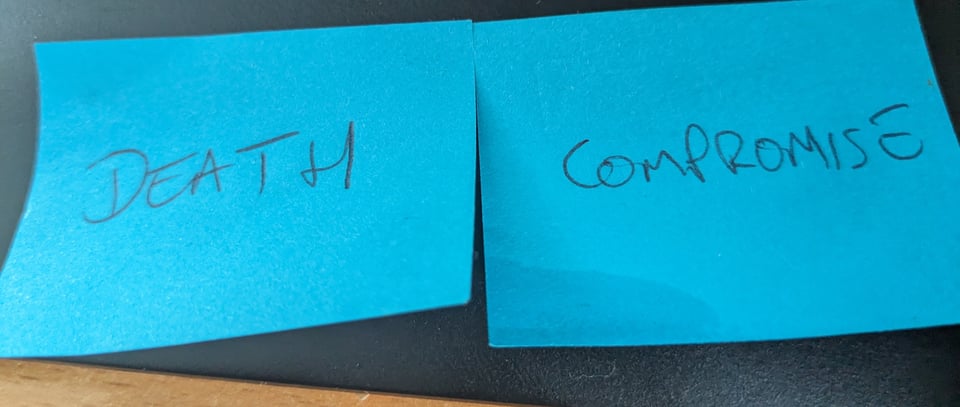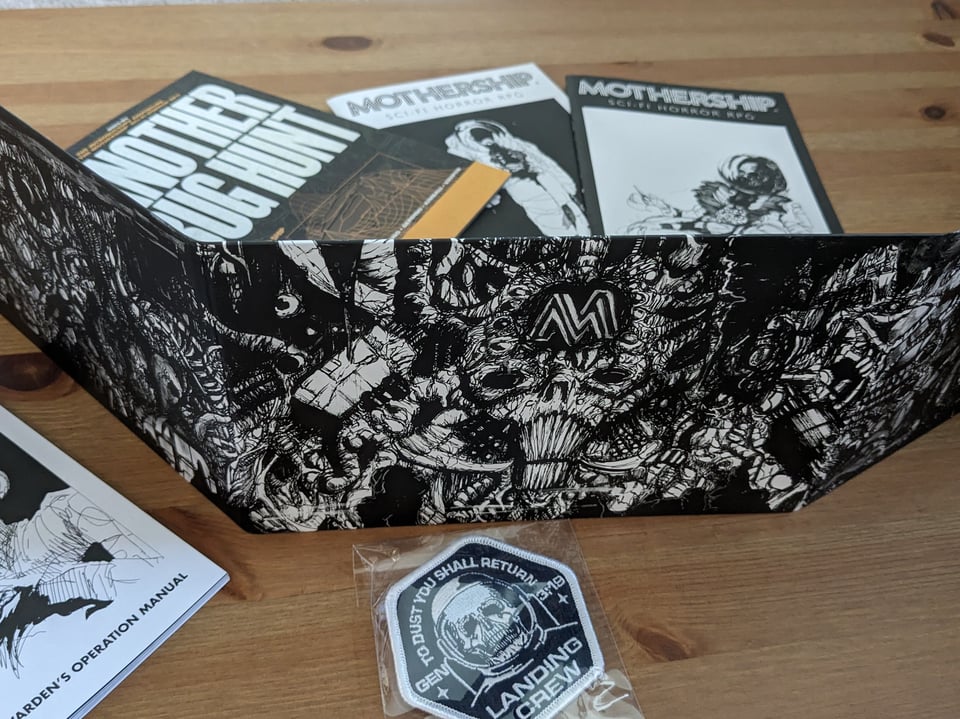The One About The REAVER Rules
This is the TEETH newsletter, a regularly irregular transmission about our adventures in the very secret land of Tabletop Roleplaying-Games. We have published a whole series of our own TTRPGs now! More games are here in this very newsletter. And we shall play many others, and then report on those experiences right here, too.
This newsletter is written and compiled by reliable bilge-pump, Jim Rossignol, and much barnacled anchor, Marsh Davies.
IMPORTANT NOTICE: YOU CAN BUY OUR BOOKS AND ZINES!

—
Hello, you.
Links!
REAVER: some early rules!
—
Hello, you.
If you whisk your attention down to the bottom of this newsletter you will find details about REAVER, a ruleset for sailing ships based on Forged In The Dark which will possibly, probably, presumably, definitely, (maybe?) make up a part of GOLD TEETH, our forthcoming game of supernatural piracy. “The what now?” you ask: all shall be revealed! And if you wish to immediately engage in the discussion about these things you can do so over on the TEETH Discord! Climb aboard, all are welcome.
In other news: we have continued our Blades In The Dark campaign with a giant centipede (thanks to Adrian Tchaikovsky’s City Of Last Chances for the notion), an ominous room of thigh deep water, and a birthday hangover clone ghost-antagonist escapade in the realm beyond the mirror in which Dan (whose actual real-life birthday it was) nearly didn’t survive…
I also got to playtest a thing, leading my children to question the provenance of these Post It notes on my desk.

Hmm! Perhaps the foundation for a Howitt-style RPG, as Gillen suggests? “You have one stat.” (They were, in fact, props for a Gillen RPG! But more on these mysteries another time.) For now: let us explore the strange signatures and emanations we have detected from the outside world.
—
LINKS!
THING OF THE WEEK is that the Mothership box set turned up! It sure is some zines in a box, but also this rather fetching GM shield, which I think is actually (definitely!) the best part of the package. You know what, I have never used a GM shield in 35 years of GMing? There’s an article in that: the weirdness of hiding your dice rolls! Also, one day I will get around to writing about Mothership, but not today. (You can still buy the Core set!)

How did the insanely chaotic layout of doom-metal dungeon-crawler Mörk Borg work? DID it work? What? “Most of Mörk Borg doesn't use a grid system, or any grid, for that matter. Instead, it has something far scarier—the blank page. An empty canvas for scribbled skeletons and one hundred different typefaces (you read that right).”
Gillen and some chums have only gone and written and DIE expansion! It’s got three scenarios and at least one is a horrible pun. “They’re just like the What If? comic book series, where familiar characters undergo wild changes and endure novel dangers",” claim RRD.
Late pledges only for the ambitiously-titled Archeterica Imago: The Invitation. “This is a classless 2D6 game with a focus on dramatic character development and shadow organization activities, produced by a Ukrainian creative team.”
The reliably creative Scott Malthouse is making The Terror Beneath with a dash of Arthur Machen. “The Terror Beneath is powered by the GUMSHOE roleplaying system, designed specifically to tell stories of mystery and investigation. With less emphasis on finding clues and more on interpreting them correctly, an investigation never stalls due to a critical clue being missed, but gives the heroes all the information they need to keep moving inexorably towards the horrors at the heart of the plot...”
Reearch this week: the horrible, incredible, indestructible life of Adrian Carton de Wiart. “He was shot in the face, head, stomach, ankle, leg, hip, and ear; was blinded in his left eye; survived two plane crashes; tunnelled out of a prisoner-of-war camp; and tore off his own fingers when a doctor declined to amputate them. Describing his experiences in the First World War, he wrote, "Frankly, I had enjoyed the war.""
—
REAVER: Some Early Rules (but do they rule?)
Happy newsletter, mi hearties! Today we are weighing anchor, unfurling our sails, and revealing Reaver, our naval TTRPG ruleset to the regular email crowd. It's in an unfinished “alpha” state, but we're eager to get your feedback on what works and doesn't work. It's something of a wild experiment that combines FitD staples with the abstract operation of a crewed ship, and ideally works for old hands and players with barely any nautical know-how at all. Hopefully you will tell us if the results are copper-bottomed or all at sea. In Reaver, players take on the responsibilities for different areas of a ship's operation, each with their own sheet—like a character sheet. Even if for the rest of your adventure you play as individuals, when you're at sail, you're responsible for more abstract ship functions, and test the diffuse qualities and skills of the crew in aggregate. Regardless of who the captain is in the wider fiction, all the players have a say in what happens. A ship is a complex machine comprising many moving parts and people, and no one person can control its totality: the players all have to work together to decide how best to keep the thing afloat!
Here are the rules in Google Docs: https://docs.google.com/document/d/14MLByGeR2DXRJuxT97Z0Vny8PXYMqacpdKtTFdmNyhA/edit?usp=sharing
Here are the sheets in Google Sheets: https://docs.google.com/spreadsheets/d/1r2t2VtRhjAmf6tFm6fv9HP2Z0hcmXIqxy4mc3ZGzoEE/edit?usp=sharing
Make a copy from the file menu, and you can freely edit your version of them. Obviously, this Google Doc isn't the ruleset's final form! When laid out properly, many of the terms will be linked by page references—right now, it may be a challenge to navigate around. Apologies!
And, finally: a small scenario to get you going, should you want or need one:
You are the crew of The Red Prayer—a privateer brig in the pay of the English crown, prowling the Caribbean to disrupt American and French commerce. While restocking in the town of Fort Charlotte, you receive an urgent message from your contact in Naval Intelligence: a British spy, Mme Gabeloux, has been exposed and captured by the Dutch, supposedly neutral in this war, and has been sold on to the French, who are in turn delivering her to the Americans. It is unknown what she has revealed of British plans so far, but the ship on which she is captive must be intercepted. Mme Gabeloux still has some passing value to the British—make pains to free her, but, failing that, ensure her secrets go to the bottom of the ocean along with her French chaperones. The ship she is captive aboard is La Renarde and is thought to soon be travelling through a stretch of open ocean within a day's travel of Fort Charlotte. However, there are many unknown dangers: La Renarde may be disguised as a merchant vessel, or even flying under the false flag of another nation; she may be under escort by other French vessels; other nations may also have an interest in acquiring Mme Gabeloux by force. And, of course, tharr be pirates.
Divide the Stations among your players. Long guns and fighting crew are the two Stations with the most situational rolls: it might make sense for a player to take control of both of these, or one of these and the Ship Sheet. Assign four points to the Actions of each Station, and pick at least two special abilities to unlock per sheet. The pre-made sea-dogs should be sufficient for this test—if you use them directly at all; assign four more points to their Actions.
—
A Conversation By Way Of Explanation, Or Even Exposition
JR: Marsh! You are a big ship fancier! How did that happen when you are a landlubber from Bromley?
MD: I actually went out on dinghies a fair few times as a kid—part of a well-intentioned but misfiring father-son bonding effort. I absolutely hated it. The early morning cold. The stale-sweat smell of wet-suit rubber mixed with the Medway's foul mud. The feel of the boom as it swung directly into my face, followed by, "Oh, watch out for the boom." One of our crewmates actually abandoned ship and swam to shore, so displeased was she with my father's captaincy. This loathing has lasted a full lifetime. But then, about ten years ago, retiring after a friend's stag night in something of an altered state of consciousness, I impulse-purchased the entire set of the Aubrey-Maturin nautical adventures—the novels that the film Master & Commander is based upon. Unexpectedly, this turned out to be a fantastic investment: the books are brilliant. Historically illuminating, full of richly flawed characters, beautiful writing and, of course, derring-do on the high seas. I was totally hooked, read all 20.5 of them (which fans refer to as a "circumnavigation") and felt deeply bereft when they were over—and I'm starting again now. I still hate actual sailing though.
JR: Why do an RPG about it, though? What’s your angle here?
MD: So, here's the thing. At no point during the course of reading those books did I manage to understand a single thing about sailing. Like Dr Maturin, one of the books' central characters, I remain almost immune to any technical understanding of sea-faring. And it just doesn't matter! There is so much about life at sea, and death at sea, that is fascinating and thrilling even if you don't know a yard-arm from your yard-arse. One of my hopes with Reaver is that it brings some of that delight, excitement, terror and tragedy to players, without ever having to use the words "port" or "starboard".
JR: Aubrey Maturin sounds like a TEETH character! Are machines made of rope and canvas something we can hope to express in dice and playbooks? Tell us about the Reaver system!
MD: As you've probably gathered, I'm less interested in the actual ropes and canvas than I am in who's working them. Some of these vessels had nearly 1000 people on them—all involved in intense coordination with each other, just to make ship happen, and it's their diffuse talents and knowledge, as well as their mood and well-being, that Reaver is all about. When players make a voyage, they stow their individuality. Whoever they play for the rest of the game takes a backseat: when they're sailing, players control of one or several ship stations, each with their own sheet, like a character sheet. These are broad areas of responsibility: the helm rolls for aspects of strategy and navigation; the upper decks for the mechanics of executing manoeuvres and sighting other vessels; the lower decks for maintaining the ship and its people; and so forth. When you're testing them, you're not testing an individual's talent, but the diffuse and abstract qualities of the crew at large. And the important thing is that, whoever the captain is in the wider story you are telling, everyone has a say in what the ship does. That's partly so nobody gets bored, but also because it makes sense: a ship is a complex machine comprising many moving parts and people, and no one person can control its totality. The players all have to work together to decide how best to keep the thing afloat!
JR: What have you learned from our early playtests of the game? What do you hope to glean from this initial test version? (Glean is a good word. “Gleanings” as narrative currency in a stone-age detective RPG, via Alan Moore’s Voice Of The Fire.)
MD: "May your playtests be gleaningful" is my new email sign-off. The playtests we've done have worked, but I know that's partly because our regular group of players is exceptionally generous and wise and helped me make it work, regardless of the rules. Everyone pitched in and spoke up, just as I'd hoped, keeping up the pace and creating a uniform sense of involvement. The nautical events were suitably dramatic, too—maybe more so than I intended: I miscalculated the number of dice they should have to make rolls, and so things went catastrophically wrong a little too frequently. That's at least an easy fix. I'm still not super confident in the Actions the Stations of the ship have at their disposal. Each has three, and describe different qualities that are a benefit in that area. But I'm not sure that it's a decision that means a lot when you're talking about a limited set of activities; it's not like Forged in the Dark, where you have a near infinity of approaches to a problem and many ways to style that approach. If you want to make the ship go, you gotta hoist a sail, and that's a verb with a very narrow range of possible adverbs. I'm using an extreme example—you won't be rolling for every shift of canvas, and there are ways to pose problems to players that require more ingenuity, but there is an irreducible mechanical aspect to sailing that perhaps goes up against the improvisational weighting of Forged in the Dark. What did you make of it?
JR: It was fascinating! Mostly from the perspective of having worked with Forged In The Dark type rules, I was wondering whether there was any way that could work to represent something as complex as a ship, and it did. I know things will shift and settle in playtesting, but it’s super interesting to have this different mode of play to represent the ship as a complex entity during play. Obviously these ship sequences will climax events in the game, so seeing how they might unfold is very engaging indeed. Could we use these rules in other books about moving vessels? Other giant machines?
MD: I dare say we might! One of the reasons we are making Reaver widely available this early is to ensure its ship-shape by the time we use it for our next instalment of TEETH. That'll be GOLD TEETH, no less—a Kickstarted book, of similarly fat proportions to the last one, that delivers a setting suitable for nautical peril: a cursed corner of the Caribbean, in the year of 1782.
JR: 1782! A good year for pirates. Or bad, as the case might turn out to be.
MD: Bad, really, for everyone in the Caribbean, which was still reeling from a devastating hurricane—and, in our alternate history, something even worse.
JR: Why am I excited about this, even though I know nothing about pirates aside from watching Black Sails?
MD: Because it's a thrilling and dangerous moment upon which could pivot the balance of power across the entire globe! There are those who see this fragile time as opportunity to betray their nations, break their chains or shake off an imperial yoke, in want of freedom, riches or darker things indeed. Cannons flare and blades flash as nations collide at sea, or intrigue against one another in the close alleys of the colonies. Allegiances shift, or are forged in secret; arms and powder are exchanged for sugar under cover of dark, feeding the war in North America, while sabotage and assassination wreck carefully wrought plans. And all the while the sharks circle: profiteers, privateers and pirates, ready to pick the flesh from the bones of the weak! What's not to like? I mean, apart from the high risk of drowning and violent death.
JR: That really does sound like the highest quality RPG-fodder, Marsh!
—
More soon! (trad)
Add a comment: